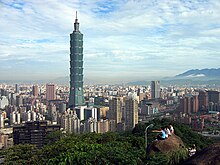Economy of Taiwan

Taipei skyline.
|
|
| Currency |
New Taiwan dollar (NT$) 1 US$ = 32.38 TWD (2016) |
|---|---|
| Calendar year | |
|
Trade organisations
|
WTO, APEC, ICC and others (as Separate Customs Territory of Taiwan, Penghu, Kinmen and Matsu) |
| Statistics | |
| GDP |
Nominal: $529.6 billion PPP rank: 20th (2014) |
|
GDP growth
|
0.69% (Q2 2016) |
|
GDP per capita
|
Nominal: $22,598 (2014) PPP rank: 19th |
|
GDP by sector
|
(2009) services (tertiary) (69.2%) industry (secondary) (29.2%) agriculture (primary) (1.6%) |
| 0.33% (2013 est.) | |
|
Population below poverty line
|
1.5% (2012 est.) |
|
Labour force
|
11.54 million (2014 est.) |
|
Labour force by occupation
|
agriculture (5%), industry (36.1%), services (58.9%) (2014 est.) |
| Unemployment | 4% (2014 est.) |
|
Main industries
|
Electronics, communications and information technology products, petroleum refining, armaments, chemicals, textiles, iron and steel, machinery, cement, food processing, vehicles, consumer products, pharmaceuticals |
| 11th (2017) | |
| External | |
| Exports | $318 billion (2014 est.) |
|
Export goods
|
Electronics, flat panels, ships, petrochemicals, machinery; metals; textiles, plastics and chemicals (2014) |
|
Main export partners
|
|
| Imports | $277.5 billion (2014 est.) |
|
Import goods
|
Electronics, machinery, crude petroleum, computers, coal, organic chemicals, metals (2014) |
|
Main import partners
|
|
|
FDI stock
|
$64.2 billion (at home; 31 December 2011 est.); $213.1 billion (abroad; 31 December 2011 est.) |
|
Gross external debt
|
$146.8 billion (31 December 2013 est.) |
| Public finances | |
| Revenues | $78.25 billion (2011 est.) |
| Expenses | $88.66 billion (2011 est.) |
|
Standard & Poor's: AA- (Domestic) AA- (Foreign) AA+ (T&C Assessment) Outlook: Stable Moody's: Aa3 Outlook: Stable Fitch: A+ Outlook: Stable |
|
Nominal: $529.6 billion
Nominal rank: 26th (2014)
Nominal: $22,598 (2014)
Nominal rank: 36th;
$23,456 (2015 IMF estimate)
Electronics, communications and information technology products, petroleum refining, armaments, chemicals, textiles, iron and steel, machinery, cement, food processing, vehicles, consumer products, pharmaceuticals
Agricultural: Rice, corn, vegetables, fruit, tea; pigs, poultry, beef, milk; fish
The economy of the Republic of China (Taiwan), simply called Taiwan, is the 5th largest economy in Asia, and is included in the Advanced economies group by the International Monetary Fund, and ranked 15th in the world by the Global Competitiveness Report of World Economic Forum, has a developed capitalist economy that ranks as the 19th-largest in the world by purchasing power parity (PPP), ranks as 18th in the world by gross domestic product (GDP) at purchasing power parity per capita (person), and 24th in nominal GDP of investment and foreign trade by the Republic of China (ROC) government, commonly referred to as Taiwan. The economy of Taiwan ranks the highest in Asia for 2015 Global Entrepreneurship Index (GEI) for specific strengths. Most large government-owned banks and industrial firms have been privatized. With the technocracy-centered economic planning under martial law until 1987, real growth in GDP has averaged about 8% during the past three decades. Exports have grown even faster and since World War II, have provided the primary impetus for industrialization. Inflation and unemployment are low; the trade surplus is substantial; and foreign reserves are the world's fourth largest. Agriculture contributes 3% to GDP, down from 35% in 1952, and the service sector makes up 73% of the economy. Traditional labor-intensive industries are steadily being moved off-shore and replaced with more capital- and technology-intensive industries. Economy of Taiwan is an indispensable partner in the Global Value Chains of Electronics Industry.Electronic components and personal computer are two areas of international strength of Taiwan's Information Technology industry, which means the economy of Taiwan has the competitive edge on having the learning curve from advanced foreign technologies with lower cost to be produced and sold abroad. Institute for Information Industry with its international recognitions is responsible for the development of IT industry and ICT industry in Taiwan. Industrial Technology Research Institute with its global partners is the advanced research center for applied technology for the economy of Taiwan. Directorate-General of Budget, Accounting and Statistics and Ministry of Economic Affairs release major economic indicators of the economy of Taiwan. Chung-Hua Institution for Economic Research provides economic forecast at the forefront for the economy of Taiwan and authoritatively researches on the bilateral economic relations with ASEAN by The Taiwan ASEAN Studies Center (TASC). is the host to the listed companies of local industries in Taiwan with weighted financial exposures to the FTSE Taiwan Index and MSCI Taiwan Index.
...
Wikipedia
